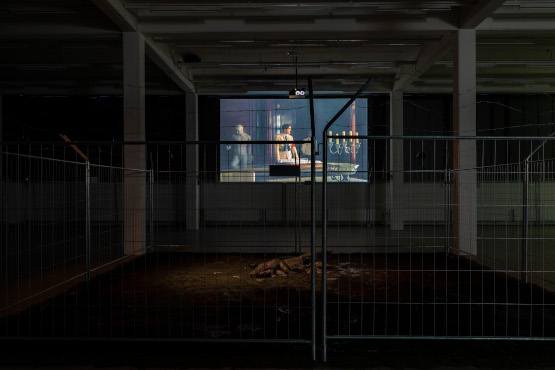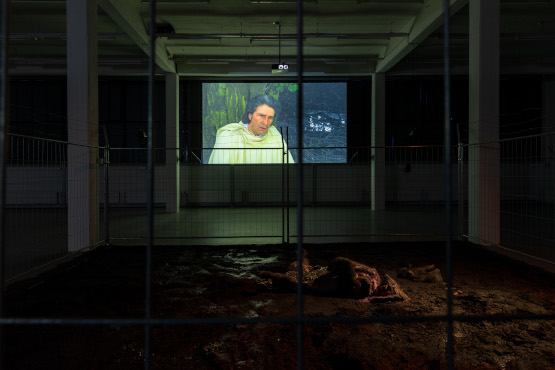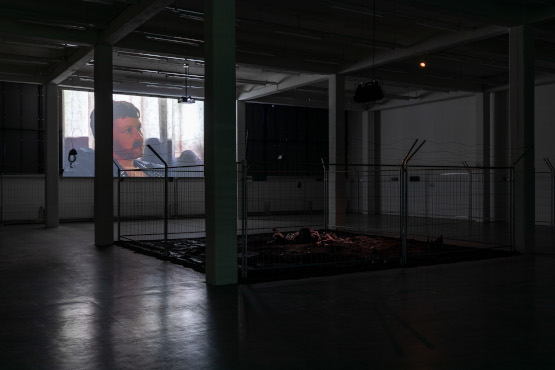Journal

Albert Serra, The Three Little Pigs
Exhibition view, Kunstverein in Hamburg, 2021, Photo: Fred Dott

Albert Serra, The Three Little Pigs
Exhibition view, Kunstverein in Hamburg, 2021, Photo: Fred Dott

Albert Serra, The Three Little Pigs
Exhibition view, Kunstverein in Hamburg, 2021, Photo: Fred Dott
Online: Artist Talk with Albert Serra, »The Three Little Pigs«
In cooperation with Kunstverein in Hamburg: Albert Serra in conversation with Bettina Steinbrügge and Benjamin Fellmann
From June 19th through August 15th, 2021, Kunstverein in Hamburg will screen the monumental film work The Three Little Pigs by the Catalan filmmaker Albert Serra in a large, multi-channel installation in his exhibition of the same title. In a cooperation of the Kunstverein and the Warburg-Haus in the context of this year’s annual Warburg-Haus focus topic, »Images as Agents of the Political«, Albert Serra, one of the most influential contemporary filmmakers, speaks to Bettina Steinbrügge (Kunstverein in Hamburg, curator of the exhibition) and Benjamin Fellmann (Warburg-Haus) about the genesis and scope of this work and the impressive installation at the Kunstverein.
The Talk was recorded on the occasion of the exhibition’s opening on June 19th and is available online. You may find a booklet with a text about The Three Little Pigs by Bettina Steinbrügge and Benjamin Fellmann available for download at the bottom of this page.
Catalan filmmaker Albert Serra is among the most influential and radical representatives of international avant-garde cinema today. The Three Little Pigs was made in Kassel on the occasion of documenta 13 in 2012 with daily filming over the entire run of documenta’s one hundred days. This »longest film in the world« (Der Standard) is a portrait of Germany and an illustrated reflection on the shaping of history and our perception of it. To this end, the film follows the stories of three main characters from German cultural history: Goethe, Hitler, and Fassbinder. The film, with a total run-time of 101 hours, is a faithful adaptation of Johann Peter Eckermann’s Gespräche mit Goethe in den letzten Jahren seines Lebens (Conversations with Goethe in the Last Years of His Life, published in three parts from 1836–1848) as well as a selection from Hitler’s table talks, published in an English translation with commentary by British historian Hugh Trevor-Roper in 1953 (first released in 1951 as the first publication of the Institute for Contemporary History Munich). The structures, dialogues, chronologies, and diary-like character of both texts fully remain and are precisely staged, although in Goethe’s case, descriptions of situations serve as the basis for the transposition and text in the third person is transposed into the first. In the case of Hitler’s table talks, the dialogues remain unchanged and Serra drew on additional historical studies for creating settings for them. The third document from which Serra draws interviews and statements is Fassbinder über Fassbinder: Die ungekürzten Interviews (Fassbinder on Fassbinder: The Unabridged Interviews, 2004) edited by Robert Fischer.
The character Fassbinder and his statements provide the artist with a counterweight to the stringency of the other two parts. Serra himself appropriates Fassbinder’s character and opinions about Germany, art, and film—supplemented by personal and intimate aspects of the filmmaker— in order to freely contrast them with the other two. These texts are not dramatized, nor is there improvisation or any variations: page for page, the actors perform as Johann Wolfgang von Goethe, Adolf Hitler, and Rainer Werner Fassbinder by quoting completely and verbatim the published texts.
Thanks to its artistic, reflective potential, the work has become even more relevant today in a political landscape that has quickly and dramatically changed: the years since its creation have seen the founding of the AfD in 2013, the so-called »migration crisis« of 2015, the Brexit referendum and Donald Trump’s election in 2016, and the AfD’s entry into the Bundestag in 2017, to name but a few key events.
Serra’s hundred-hour film can also be understood as an exercise in attention and, in this respect, of not allowing oneself to be overwhelmed. Wherever there is a continuous stream of speech, it becomes insistently clear that words can never be dismissed as mere words. At a time when nationalisms are again playing a significant role, national identities and identity constructions need to be continuously and critically questioned.
Albert Serra was born in 1975. Since his sensational debut Honor de Cavalleria (2006), all his films have received great attention at festivals, including most recently, Historia de la meva mort (2013), which received the top prize at the Locarno Film Festival. His cinema is committed to reduction. He works with a small, trusted crew, meager budgets, and always with non-professional actors. Having studied literature and art history, Serra’s films focus on well-known literary and historical figures—Don Quixote, the Three Wise Men, Casanova, and Dracula—without being classical adaptations. He purges his material of its mythic baggage in order to explore its meaning in the here and now.
Text by Bettina Steinbrügge and Benjamin Fellmann
Ausstellung / Bilder als Akteure des Politischen / Publikationen